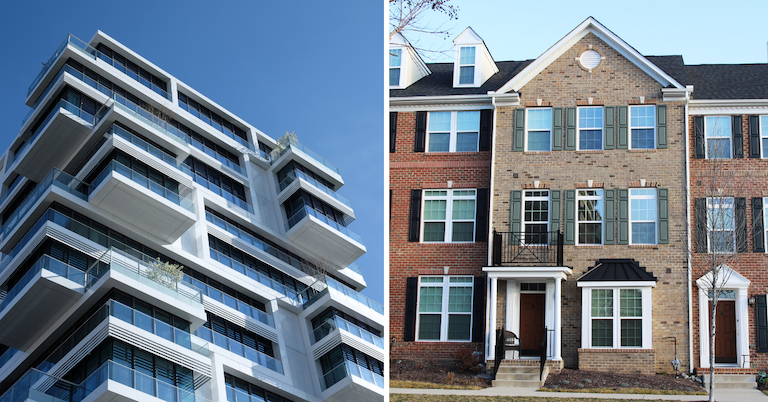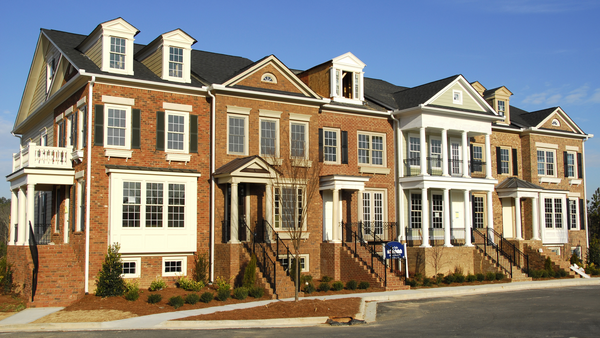One of the first and most important factors that go into buying a home is the type of home you plan to buy. While detached single family homes are the most popular option, these types of homes are not for everyone. Not only do they tend to be more expensive than other housing options, but they also require more time consuming landscaping and outdoor maintenance.
If you find yourself looking into alternative housing options, you’ll likely come down to middle housing options like townhomes and condos. These two housing options are great for those seeking homeownership without the financial strain or maintenance that comes with a larger home. There are quite a few similarities between these home types, but there are also quite a few differences.
Let's break down the similarities and differences between condos and townhomes so that you can make the home purchase decision that is right for you.
Condo vs Townhome: The Basics
A condo is similar to an apartment in that it’s an individual unit located within a building or set in a community of buildings. The defining difference is that a condo is owned by the resident, not rented from a landlord.
A townhome is often considered a hybrid between a single family detached home and a condo. In a townhome, one or more of the walls are shared with an adjacent attached townhome. This means there is slightly more privacy than a condo.
Condos and townhomes are most often found in urban and suburban areas due to their smaller size. The biggest difference between these two property types is the ownership, fees, maintenance, and space associated with them.
Similarities
Affordability
Compared to traditional single family homes, townhomes and condos tend to be the more affordable option. This often means buyers can get more square footage in a townhome or condo. Of course, this comes with some compromises like less privacy and lack of yard.
Home Ownership
Home ownership is no longer as affordable as it once was. This is especially true for single family homes. Luckily, condos and townhomes offer home ownership at a more affordable price. This homeownership means that you would be responsible for all of the maintenance within the property’s walls.
HOA Fees
Most townhomes and condos belong to a homeowners association (HOA). This means that owners of these properties pay a monthly fee to cover costs of various amenities and exterior maintenance. This HOA fee is generally a positive one as it requires less maintenance on the owners part and allows them to take advantage of onside amenities. However, HAOs can also have strict regulations around what owners can and can’t do to the property.
Less Maintenance
Because of the smaller size and minimal yard space, HOAs often cover some of the home’s exterior maintenance. This includes lawn mowing, tree/ shrub trimming, snow removal, and landscaping. For home buyers looking to sit back, relax and avoid exterior maintenance, condos and townhomes are a fantastic option.
Slower Appreciation
Condos and townhomes tend to be tailored towards more niche markets such as younger singles or couples in more urban and suburban areas. As a result, these types of properties have a slower appreciation rate than a traditional single family home. Of course, that is not to say these types of properties won’t increase in value overtime. They will definitely increase, just at a slower pace.
Less Privacy
One of the benefits of single family detached homes is the yard space that separates the homes from one another. When purchasing a condo or townhome, home buyers can plan on sharing walls with at least one of your next door neighbors. Of the two types, townhomes tend to have less shared walls than condo units. For someone who enjoys a certain level of privacy within their home, this might be a dealbreaker.
Differences
Vertical Layout
Condos are similar to apartments in the sense that the unit has only one story. This means that condo owners are likely to have either upstairs or downstairs neighbors in addition to sharing walls with other properties. Most townhomes have a vertical layout with three to four stories. You may have neighbors to the left and right, but none above or below.
Amenity Options
Paying HOA fees, townhouse and condo owners will have amenities at their disposal. It should be noted that the amenities offered are not always equal. At most condo complexes or buildings, owners will find an abundance of amenities similar to what they would find living in an apartment complex or building. But, townhomes are not always set up to include the same amenities. Some townhome communities are stand-alone with no included amenities while others are located within larger master planned communities with amenities galore.
Interior Space
While both are generally smaller property sizes, the size of the interior space within a condo versus a townhome is very different. Because condos are one story, they tend to be smaller in square footage than townhomes. If you’re looking for a home with more living space, this may be a determining factor.
Yard and Garage
Condos and townhomes both have considerably less yard space than traditional single family homes. Some don’t have any yard at all. Condos are typically located within a condo building which means they don’t have a yard. Instead of a garage, owners will either park in a parking lot within the complex or in a parking garage attached to the building. Townhomes tend to have a small front and backyard and a one-to-two car garage. This could be a pro or con depending on what you are looking for in an outdoor space.
As you can see there are many similarities and differences between condos and townhomes. Each one offers their own unique pros and cons. At the end of the day, both housing options are great choices for buyers seeking home ownership at a more affordable price.
Are you searching for a perfect condo or townhome of your own? Let the SimpleShowing team help you out in our search. Find a condo or townhome that you like and schedule a showing with one of our agents. Be sure to take advantage of our buyer refund to get half of your agent's commission back at closing when you buy a home!


